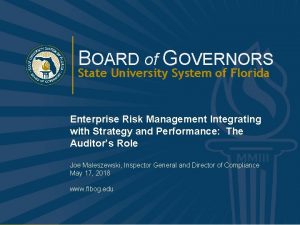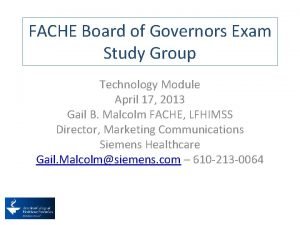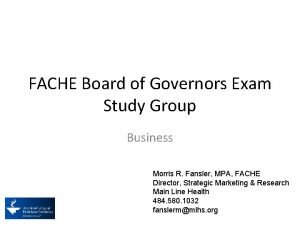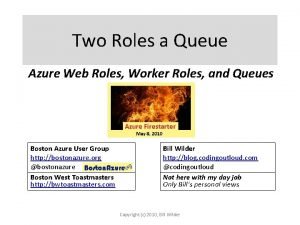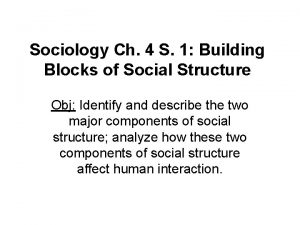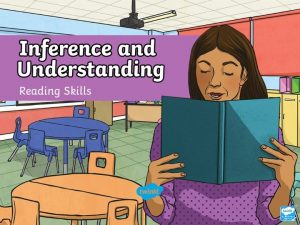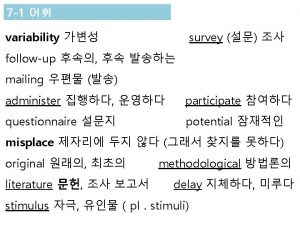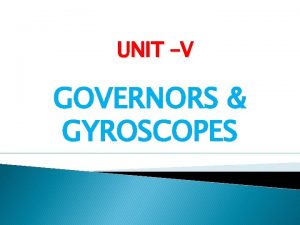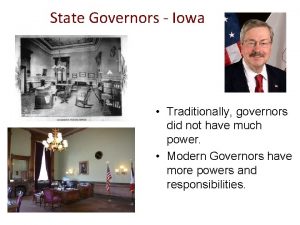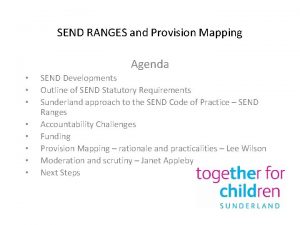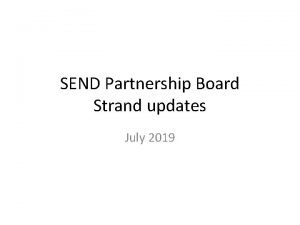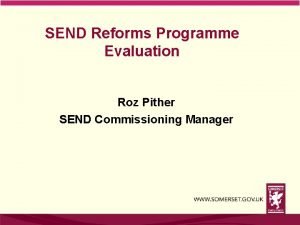The SEND Governors Role Welcome Aim To look


























- Slides: 26

The SEND Governor’s Role • Welcome

Aim: • To look at the statutory requirements relating to Special Educational Needs and Disabilities (SEND) • To look at the SEND governor’s role, and recommendations / best practice in terms of carrying it out

Agenda: • • Definitions The Legislation The SENCo The Governing Board’s responsibilities The SEND Governor Governing Board meetings The SEN Information Report

The SEND Code of Practice 2015 (0 -25 years): “A child or young person has SEN if they have a learning difficulty or disability which calls for special educational provision to be made for them. “ “A child or young person has a learning difficulty or disability: • if they have a significantly greater difficulty in learning than the majority of others of the same age, or • if they have a disability which prevents or hinders them from making use of facilities of a kind generally provided for others of the same age in mainstream schools”

The Equality Act 2010 defines disability as: “ a physical or mental impairment which has a long-term and substantial adverse effect on the ability to carry out normal day-to-day activities” • Long-term is defined as “a year or more” • Substantial is defined as “more than minor or trivial” • Sensory (sight/hearing) impairments are included, as are long-term health conditions such as asthma, diabetes, epilepsy and cancer.

What does it mean for schools? • Children with long-term health conditions do not necessarily have SEN (and vice versa) but there is a significant overlap. • Schools must not discriminate (directly or indirectly, for a reason arising in consequence of the disability) and they must make reasonable adjustments. • Schools must have regard to both the Equality Act and the SEND Code of Practice when they are planning their provision.

What does it mean for schools? In all the relevant legislation, ie including: • Children and Families Act 2014 (Part 3) • SEND Code of Practice 2015 • The Equality Act 2010 (Df. E Advice for Schools – May 14) • Supporting pupils with medical conditions (Dec 15) The common focus is: Inclusive practice and removing barriers to learning

Children and Families Act/SEND Co. P: • Puts the child and family at the centre - “having regard to views and wishes of children and parents” - children and their families to participate in decisions - increased focus on best possible outcomes and aspirations - at age 16, pupil’s view takes precedence over parents’ • Education, Health & Care (ECH) Plans • The Local Offer: Local Authorities must publish, and schools must collaborate with their LA. • Graduated Approach to SEND - “SEN Support” category (no more ‘School Action (+)’) - inclusive Quality First Teaching and targeted interventions.

The SENCo Governing Boards must ensure that there is a qualified teacher designated as Special Educational Needs Coordinator (SENCo) for the school. The SEND Code of Practice 2015 (page 108 -109) • Must be a qualified teacher working at the school “…most effective if part of senior leadership team” (para 6. 87) • All newly designated SENCos must achieve the National Award in SEN coordination within 3 years of taking on role (excepting SENCos with >12 months standing before 01. 09) • Works with school leadership to determine SEND policy & provision, plus day-to-day operational responsibility

The SENCo “The school should ensure that the SENCo has sufficient time and resources to carry out their functions. This should include providing the SENCo with sufficient administrative support and sufficient time away from teaching to enable them to fulfil their responsibilities in a similar way to other important strategic roles within a school. “ Do your school’s arrangements meet these criteria?

Responsibilities of the Governing Boards of maintained schools and academies have legal duties in relation to pupils with SEND, including that they must: • Use their best endeavours to make sure any child with SEND gets the support they need. • Ensure that pupils with SEND engage in the activities of the school alongside those who do not have SEND. • Inform parents when making special educational provision for their child. • Ensure arrangements are in place to support children with medical conditions. • Co-operate with the LA on local provision and the Local Offer.

Governing Boards must also: • Have a clear approach for identifying and responding to SEND - including in regards to the use of resources, keeping up to date, and the accurate recording of provision. (SEND Policy) • Publish on their websites re the implementation of the board’s policy for pupils with SEND (SEN Information Report. ) • Publish their arrangements for admission of disabled children, the steps being taken to prevent disabled children being treated less favourably than others, the facilities provided to assist access for disabled children and their accessibility plans. • Provide a broad and balanced curriculum, and an annual report for parents on their child’s progress.

Inclusivity and whole school approach: “The leaders of early years settings, schools and colleges should establish and maintain a culture of high expectations that expects those working with children and young people with SEND or disabilities to include them in all the opportunities available to other children and young people, so they can achieve well. ” “School leaders should review regularly how expertise and resources used to address SEND can be used to build the quality of whole-school provision as part of their approach to school improvement”

The SEND Governor There should be a member of the governing board, or a sub-committee, with specific oversight of the school’s arrangements for special educational needs (SEN) and disability The SEND Code of Practice 2015 (page 92 para 6. 3) Table Discussion: What should the SEND Governor do… and report?

The SEND Governor role • Raises awareness of SEN, inclusion and disability issues at Governing Board meetings; ensuring the Board is kept well informed. • Meets regularly with the SENCo (and possibly other school leaders and staff) to monitor the school’s provision, and give up-to-date reports to the Governing Board. • Monitors those parts of the School Development Plan relating to SEND.

The SEND Governor role • Ensures the school carries out the annual update of its SEN Information Report and Local Offer (RBWM schools - these docs are combined. ) • Monitors how school funding relating to SEND is being allocated and spent. • Monitors the arrangements in place to support children with medical conditions. • Takes a lead role during review of SEND Policy (ratification by Governing Board required)

The SEND Governor should have • An interest in SEND (strategic role) • Good communication skills - to report back verbally at governor meetings and provide a written report • Availability - to meet regularly with the SENCo, to visit the school, and to take advantage of relevant briefing and training opportunities • A willingness to participate in the development and review of school policy relating to SEND

Meetings with the SENCo • The recommendation is to have termly meetings • Agree the focus of each meeting in advance, so that SEND governor and SENCo can prepare (pre-reading) • Take notes at the meeting -> write up your report a. s. a. p. -> agree the report with the SENCo and Headteacher before it goes to the Governing Board • Be knowledgeable about the school’s links with other schools and agencies

Questions you could ask… • How does the school identify pupils with SEND? • How does curriculum planning involve/consider SEND? • Re current progress of SEND pupils - what is being done to overcome barriers and address any gaps? • How do you support and train staff who work with pupils with SEND? What impact is this having? • How do you evaluate the effectiveness of the resources and interventions being deployed? It’s good practice to look at anonymised pupil information - such as case studies and provision maps - for evidence.

Reporting back to the Board • The SEND Governor delivers a written report following each visit (governor visit report form) • The visit report should outline the objective of this visit, the key discussion points and findings and the proposed next steps for governing board monitoring going forward. What other possible sources of information / data would the Board have at its meetings, relating to SEND?

Possible information (triangulation!) As well as SEND Governor verbal and written reports: • SENCo presentations / reports to the Board (maybe) • Headteacher’s reports (including statistics relating to behaviour, attendance, exclusions) • Finance committee minutes/reports: SEND funding and allocation; resources and facilities • Standards committee minutes/reports: - Progress and attainment data for groups of pupils - Quality of teaching and assessment (inc CPD) - Curriculum and co-curriculum/extended provision

Does the Board… ? • Allocate appropriate meeting time to SEND? (If there is a school key priority relating to SEND, could this be a standing item on agendas? ) • Review the SEND Policy on a regular basis, and ratify the SEN Information Report annually? • Ensure all the school’s policies fully support the principle of inclusion of pupils with SEND (eg behaviour, outdoor learning, educational visits…. ) • Provide a hand-over opportunity for outgoing/incoming SEND governors?

The SEN Information Report Governing Boards must publish information on the provision for pupils with SEND in an easily accessible and understandable format for parents (school website) • Must be reviewed annually (plus any changes during the year to be updated as soon as possible. ) • SEN Information Report to be ratified by the Board. • Schools inside RBWM have a template to use.

The SEN Information Report Includes • How the school identifies and assesses SEND • The support provided for pupils with SEND (strategies, interventions, adaptations, training of staff, specialist services, well-being support, accessibility) • How the children’s progress is reviewed • Preparations for transition into the school, and on to the next phase • How to raise concerns and make complaints • Information on where the Local Offer is published

SEND Governor – final points • Keep a strategic overview. It is not the remit of the SEND Governor to become drawn into issues relating to individual children. • Respect confidentiality. The SEND governor may on occasion receive sensitive information about the circumstances of children who, although anonymised, may be identifiable by process of deduction - particularly in smaller schools. It is essential that the SEND Governor respects the confidentiality of such information.

Any questions? ? Governor Services Support Officer: Rebecca. Walker@achievingforchildren. org. uk
 Left right look
Left right look Role of send governor
Role of send governor Board of governors state university system of florida
Board of governors state university system of florida Governors scholar program
Governors scholar program Ri board of governors
Ri board of governors Headteachers report to governors
Headteachers report to governors Gsp teacher recommendation
Gsp teacher recommendation Types of governors
Types of governors Fache exam questions
Fache exam questions Fache exam sample questions
Fache exam sample questions Board of governors state university system of florida
Board of governors state university system of florida Wise men three clever are we
Wise men three clever are we Worker role azure
Worker role azure Krappmann role taking
Krappmann role taking Statuses and their related roles determine the structure
Statuses and their related roles determine the structure Look at the picture in activity 1
Look at the picture in activity 1 Look at the image in activity 1
Look at the image in activity 1 Look at activity 1 and write
Look at activity 1 and write Thơ thất ngôn tứ tuyệt đường luật
Thơ thất ngôn tứ tuyệt đường luật Hát lên người ơi alleluia
Hát lên người ơi alleluia Hổ đẻ mỗi lứa mấy con
Hổ đẻ mỗi lứa mấy con Diễn thế sinh thái là
Diễn thế sinh thái là Vẽ hình chiếu vuông góc của vật thể sau
Vẽ hình chiếu vuông góc của vật thể sau Làm thế nào để 102-1=99
Làm thế nào để 102-1=99 Công thức tính thế năng
Công thức tính thế năng Thế nào là mạng điện lắp đặt kiểu nổi
Thế nào là mạng điện lắp đặt kiểu nổi Tỉ lệ cơ thể trẻ em
Tỉ lệ cơ thể trẻ em


